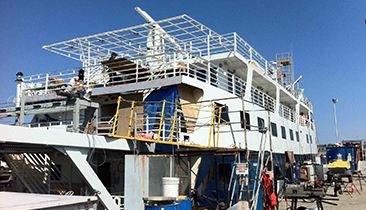Un-Cruise Refit
The Safari Voyager was stripped down to bare steel for extensive steel repair. It had corroded sections in several spaces and all new paneling replaced in common areas and guest quarters
Product:ACS CIC 4.0
Goal:Reduce Solar Heat Load, Prevent Rust and Corrosion
The Safari Voyager, is a smaller draft cruise ship operated by Un-Cruise, based in Seattle, WA. This ship was stripped down to bare steel, had extensive steel repair of corroded sections in several spaces and all new paneling replaced in common areas and guest quarters. ACS Ceramic Insulation Coating (CIC) was applied throughout the ship on all interior surfaces with exposure to exterior. That included all the top deck’s overhead and all the superstructure’s bulkheads facing the exterior. A dry film thickness of 2mm (80 mils) was applied, using a total of about 1,200 gallons. The CIC was applied by Un-Cruise’s paint applicator over the course of the refit.
The intent was to reduce penetration of exterior heat caused by solar heat loading on exterior surfaces. Solar heat loading on ship exteriors can easily reach 155F/68C and the 2mm/80 mils of CIC reduces that heat’s penetration through the steel to about 100F/37C on the interior coating surface.
Overheads and bulkheads were coated with 80 mils (2mm) of ACS Ceramic Insulation Coating (CIC). The scheduled operating areas will be hot climates where solar heat loading heats exterior steel surfaces to 155F/68C. ACS CIC will reduce heat loading to about 100F/37C or less on interior surfaces, allowing the HVAC system to be more efficient and improving overall comfort inside the ship. Condensation on interior surfaces will also be reduced and prevent corrosion that had required steel plate replacement throughout the ship

